After 25 years of building and re-building, the Atlanta Baroque Orchestra has found stability and high artistic success. ‘They had their own unique scene in that region of the country. They had their own sound and styles.’
The ATL’s early-music ensembles, often led by visitors to the city, moves in fits and starts
‘Atlanta is a huge city and a vibrant city. I want to encourage younger players to move there.’
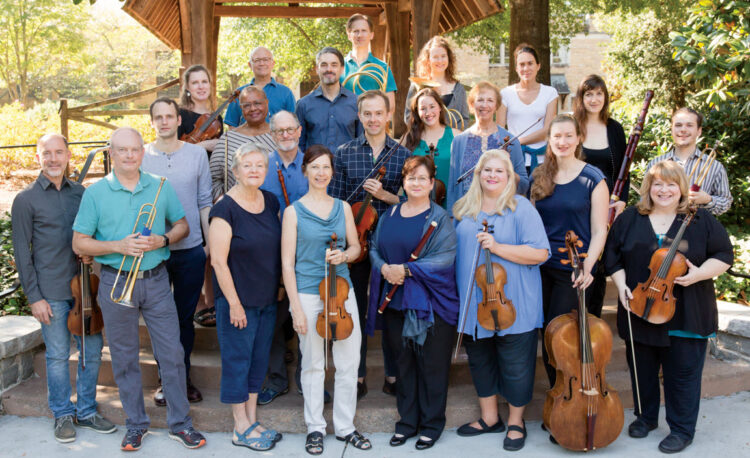
Atlanta is a cultural powerhouse, a dominant musical presence. It boasts international influence and nurtures renowned artists in the hip-hop and R&B scene. In this creative hotbed, the Atlanta Symphony has earned wide admiration, including some 27 Grammy Awards. The orchestra’s all-volunteer Chorus, founded by choral legend Robert Shaw, has carved a separate identity from its parent ensemble, with its own a cappella recordings and multiple concert performances in Germany with the mighty Berlin Philharmonic. At home, the city’s arts community has embraced the Atlanta Symphony’s newest music director, Nathalie Stutzmann, who transitioned from early-music contralto to conductor — and, shockingly, stands as the sole woman leading a major American orchestra.
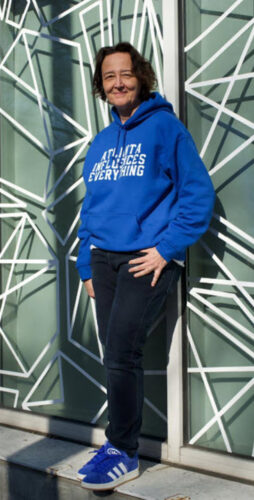
From Martin Luther King, Jr. and the Civil Rights Movement to Georgia’s political status as a hard-fought Southern “purple” state, from its powerful film and TV industry to high-dollar tech start-ups, Atlanta’s vibe is that matters of local importance often carry national significance. From its massive airport, the largest in the world, you can catch a direct flight to many cities around the globe. News and trends fly fast.
In this buzzing Deep South boomtown — with a metro population pushing past 6 million and nicknamed “the ATL” — there’s a mindset of limitless possibilities and a sense the wider world will take notice. It’s sparked a slogan that adorns t-shirts and bumper stickers seen all over: “Atlanta Influences Everything.”
Atlanta’s early music and historical performance haven’t had the same impact on the national scene — not yet anyway — despite broad cultural awareness and abundant local wealth. With the Atlanta Baroque Orchestra celebrating its 25th anniversary in the 2023-24 season and a newfound sense of stability and artistic achievement, it would be foolhardy to discount a rise in Atlanta’s HIP influence.
Less than a decade ago, violinist Edwin Huizinga, now on the faculty at Oberlin, came to Georgia as a guest to lead the Atlanta Baroque Orchestra (ABO). In Atlanta he discovered something new: “I was used to knowing most of the musicians I work with. We all play in various groups and come together in various configurations,” Huizinga recalls of this one-off gig. “But I got to Atlanta, and I didn’t know any of them, it really felt like they had their own unique scene in that region of the country. They had their own sound and styles.”
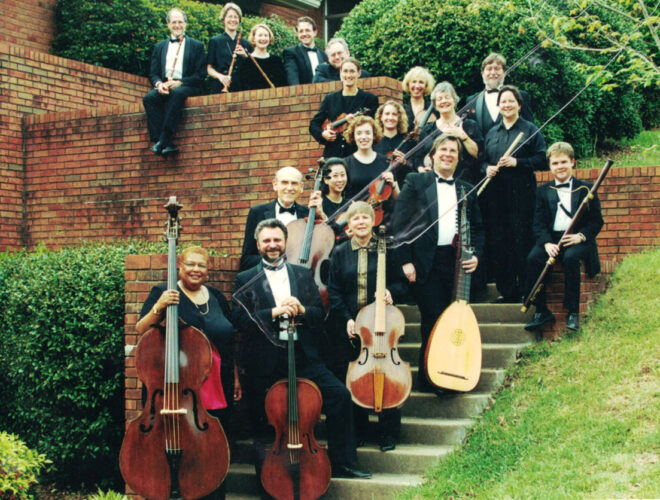
The scene’s been slow to form, as recorder player and local organizer Jody Miller puts it, “because there’s never been a magical, sustained funding source. That sums up what life is like in Atlanta: There are opportunities, but you have to create every one of them from scratch.”
‘There are opportunities, but you have to create every one of them from scratch’
Violinist Julie Andrijeski, ABO’s artistic director since 2011, finds that once people hear this music, they’ll respond to it. Early in her tenure, for example, a review titled “Hot Baroque Sizzle” observed that for Francesco Geminiani’s La Follia, the ABO “reveled in its earthy roots. They played it with tight virtuosity and the show-stealing abandon that a bluegrass fiddle band reserves for ‘The Orange Blossom Special.’”
“Atlanta is a huge city and a vibrant city,” says Andrijeski, reached at her home in Cleveland. “I want to encourage younger players to move there. I want Atlanta to become a destination — for musicians to come and play but also for audiences to come and hear, and for us to export it, to the region and perhaps beyond.”
‘Brief but electrifying’
The stirrings of early music in Atlanta started with George Kelischek, an apprentice cabinetmaker in post-war Germany and eventually a master luthier. He arrived in Atlanta in 1960 and soon founded the Atlanta Recorder Society, later adopted as Emory University’s Early Music Consort, laying the groundwork for both amateur and professional pursuits.
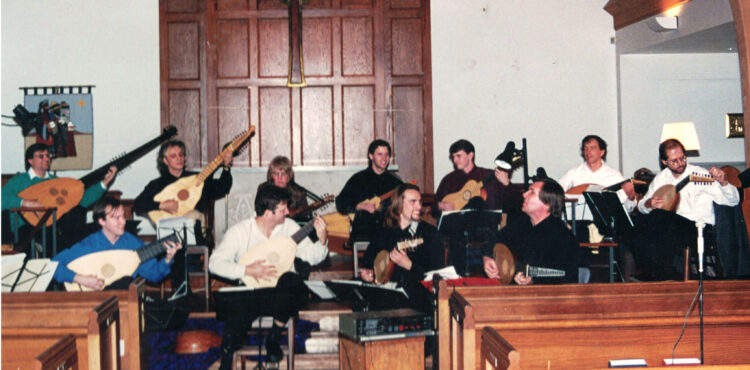
That simmered for 30 years, with a scene starting to congeal only in the early 1990s. Clayton State University, just south of Atlanta, boasted the new, acoustically sparkling 400-seat Spivey Hall and recruited lutenist Lyle Nordstrom to head its music department and start an early-music program. He brought with him several students from Michigan’s Oakland University — a roster that would include budding sopranos Wendy Baker and Jolie Greenleaf (now director of New York’s TENET Vocal Artists). Nordstrom, with help from his wife, recorder player Patricia, and local cellist and gambist Martha Bishop, put together an ensemble that, as he recalls, “gave me a bit of an impetus that more things like that were possible in Atlanta.”
With that foundation, the Atlanta Baroque Orchestra was organized around five historically informed musicians: Nordstrom, cellists Bishop and Eckhart Richter, flutist Catherine Bull, and keyboardist Daniel Pyle. They held auditions, inviting musicians from Georgia, Alabama, and northern Florida — driving distances — to participate. Its successful debut, in January 1998, featured violinist Stanley Ritchie as soloist. The concerts were well attended. But more than that: As the soft-spoken Nordstrom recalls, “several people told me, This is great! They wanted to give us money to keep going.”
Beyond its own concerts, Nordstrom envisioned the ABO as an orchestra that could collaborate with other institutions. A church choir wanting to sing a Bach cantata or Messiah? A university wanting to stage a Baroque opera? The ambitious new ABO was for hire.
Yet they hadn’t flown very close to the sun before the wax started melting. After the ABO’s third season, Nordstrom took a plum faculty position at the University of North Texas (where he would help build a powerhouse program with vast student and scholarly resources). For two seasons he tried commuting, but finally resigned as the ABO’s director. The board was prepared to dissolve the ensemble, along with its 501(c)3 tax status, but keyboardist Pyle and flutist (and board member) Janice Joyce had their own vision, of an early-music band that could survive and thrive.
The new plan had Pyle in the role of resident director: coordinating instrumentalists and vocalists, drawing up the budget, and leading one program per season. Meanwhile, a two-year search using guest conductors culminated in John Hsu, a retired Cornell professor and esteemed viola da gambist, barytonist, cellist, and conductor, being named the ABO’s second artistic director. For his first concert in charge, he led Handel’s complete Water Music.
As a music journalist, I attended several of Hsu’s captivating programs, fueled by his rhythmic discipline and creative prowess. Behind the scenes, Pyle says, the conductor was reluctant to take on all the functions of an artistic director, choosing to be called “artistic advisor.” Pyle continued as resident director and administrator.
Hsu centered the repertoire on his loves, especially Classical-era composers — specifically Haydn’s middle period symphonies — and as far as Mendelssohn in the early 19th century, pushing the boundaries of “early music.” Artistically, it all clicked. But Hsu’s bright new era, like Nordstrom’s before it, also lasted a mere three years.
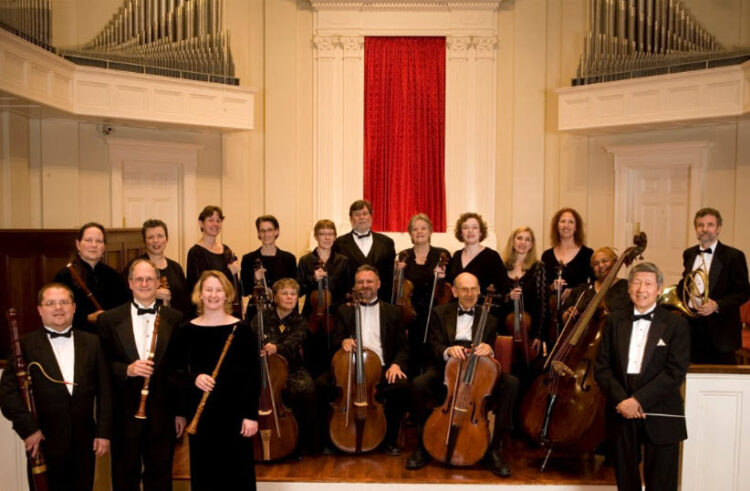
“During Hsu’s brief but electrifying tenure,” an Atlanta critic summarized, “performance standards rose dramatically but attendance eroded steadily, which the ABO attributed to Hsu’s repertoire choices: he tended to shun the excessively popular works (such as Vivaldi’s Four Seasons) as well as most vocal music. The group has a base of enthusiastic fans and a strong artistic reputation, but it lacks a clear sense of identity.” (Disclosure: That critic, Pierre Ruhe, is now Publications Director of Early Music America.)
A Scene Takes Off
Just as the Atlanta Baroque Orchestra was flourishing under Hsu’s leadership, a scrappier, nimbler ensemble tried another tack and succeeded, artistically, on its own terms. Serbian-born keyboardist and conductor Predrag Gosta founded New Trinity Baroque in 1998 as a student at London’s Trinity College of Music. He brought the name with him to Atlanta when he started in graduate school at Georgia State University.
Gosta was hungry for success, modeling his upstart period-instrument band on the flexible chorus-and-ensemble groups he’d known in the U.K. and France. He devised a five-year plan, as he recounted in 2005, “involving big, attention-getting events, like Bach Passions and Handel operas. But the money must come first. The near-term goal is to move away from hand-to-mouth and build a secure financial base.” (In addition to Gosta’s musical skills, I once described him as “a great schmoozer who is approachable and affable.”)
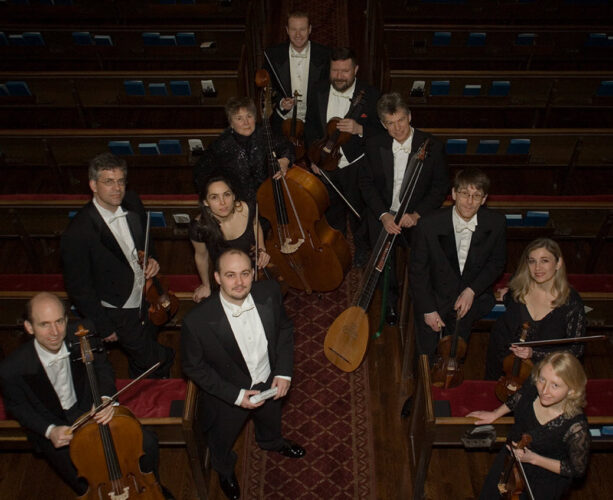
Rather than a core of personnel, he recruited musicians for each concert as the repertoire needed and the budget allowed, from duos and trios to a full-scale Bach B-minor Mass. Along the way New Trinity worked with musicians who’ve reached the top of their field, including violinists Adriene Post, Ingrid Matthews, and Carrie Krause, soprano Evelyn Tubb, recorder player Marion Verbruggen — a long and varied list.
In 2005, Gosta recruited award-winning British violinist John Holloway to become the ensemble’s music director, and the local scene looked, again, to be on the cusp of sustained greatness. “In Atlanta, there’s an audience to be built for our kind of music,” Holloway said at the time. “The U.S. is now in a parallel with the U.K. in the ’70s — a boom is about to hit. You can feel it. And I want to be here for that. It’s my chance to be a pioneer all over again.”
But the financial ups and downs continued, their bold plans never came together, and Holloway’s association lasted just a couple of seasons.
As a listener and critic, I found that New Trinity programs were often at their best in vocal music — a soprano with continuo for a Handel cantata, for example. Atlanta Baroque programs were generally all-instrumental, save for occasional big choral works, like Messiah.
Over the years, New Trinity and Atlanta Baroque filled out their rosters with some of the same musicians and, on a few occasions, clashed directly. “I think we purposely tried to avoid any competition,” Gosta recalls, “but one year we both programed Messiah, a week apart. I thought that was crazy, so we changed our date. The audience was always too small to split.”
Gosta now remembers the mid-aughts as exciting, full of adventure and promise: “We were all growing and learning — the field of early music, the ensembles, and the city of Atlanta in how to appreciate this music.”
Part of New Trinity’s strategy for broad exposure came from recordings. “I wanted to pique interest from wider audiences, not just locals, so we’d leave something permanent,” Gosta says of the group’s eight CDs. Gramophone magazine took note: “New Trinity Baroque takes a renegade tact, dusting off obscure scores and finding life in them.”
With Gosta now back in the U.K., however, New Trinity offers Atlanta concerts sporadically, mostly in the Christmas season.
Andrijeski Gets a Clear Canvas
When health issues compelled John Hsu to step down from his leadership at the end of the 2007-08 season, the Atlanta Baroque Orchestra once again searched for a new director by inviting guest performers.
This time, however, they decided it shouldn’t seek a hand-waving conductor. “As good as it had been working with John conducting — and it was a very good time — what we needed was a player-director, and most likely a violinist,” recalls keyboardist Pyle, who continued as resident director. The ensemble auditioned three candidates — some of whom didn’t know they were candidates in a search! — including Edwin Huizinga, Dana Maiben, and Julie Andrijeski.
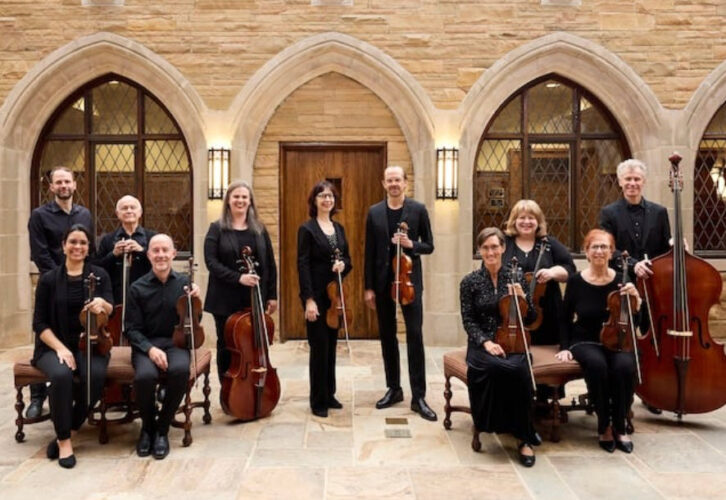
Andrijeski had something of an inside track. She had already been involved with local scene in both music and dance. At Nordstrom’s invitation, she choreographed and staged performances for students at Clayton State. And she’d performed with the ABO once before, performing as a guest director and concertmaster in a program with the orchestra and Baroque dancer Paige Whitney.
At the ABO, Hsu’s Haydn-loving tenure had been so brief that, in effect, Andrijeski had a clear canvas on which to draw the ensemble’s future. It was yet another chance to build the ensemble from scratch.
Born in Idaho, based in Cleveland, Andrijeski says those first Atlanta experiences felt like a different environment compared to the northern half of the United States, where she had spent most of her musical education and career — almost like a “foreign country” given what were the area’s unfamiliar humidity, weather, and flora.
In Andrijeski, ABO got more than a violinist-director: Her dual role as a musician and dancer gave her a distinct perspective on playing Baroque music. Since taking charge, Andrijeski has focused on shaping a unique sound and style for the ABO, rooted in dance, in physicality: When she started as music director, she recalls “spending a lot of time explaining that style and doing technical exercises with them, so they could understand where I was coming from. Over my first five years we had to do that less and less and could focus more time [in rehearsals] on the music we were playing.”
The Stability of Home
Funding and venues have been a constant challenge for almost all classical ensembles in Atlanta, with a dearth of old theaters and churches — torn down in the city’s love for developers. Andrijeski points out the ABO was finally anchored with greater stability and growth only when named artist-in-residence at the Cathedral of St. Philip, thanks to the support of Dale Adelmann, the cathedral’s canon for music, and the Friends of Cathedral Music. The cathedral supports the ABO by allowing it to rehearse and perform, alone or in collaboration with their superb Cathedral Schola.
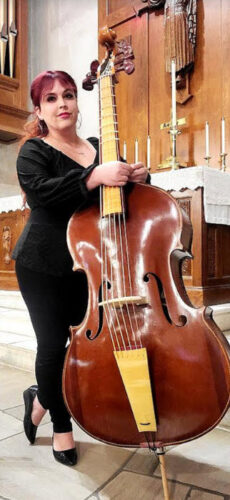
A more stable roster of musicians has been another element of ABO’s recent success. Cuban-born bassist and cellist Mia Mangano moved to Atlanta seven years ago, and now gigs with several period-instrument ensembles in the Southeast, including ABO, New Trinity, and as far away as the North Carolina Baroque Orchestra, and in Florida and up the East Coast. “There were no early-music instruments in Cuba to speak of,” Mangano says of her youth. She was introduced to historical performance while teaching and playing in Mexico, and was immediately smitten. She teaches and takes jobs with modern symphony orchestras, but that’s not quite her preference: “I wish there were more [early music] opportunities in Atlanta. Julie’s an institution, but for now [ABO] performs only four programs a season. There are more people who are now interested in early music, and more people ready to play. I’d like to do much more.”
Another key ABO member is violinist Evan Few, now the ensemble’s associate concertmaster and artistic administrator. Growing up in Atlanta, Few’s parents sang in the powerhouse Atlanta Symphony Orchestra Chorus, which can seem like the dominant fine-arts organization in the city. (One of his ancestors, Founding Father William Few, Jr., put his signature on the new U.S. Constitution and was elected to the inaugural class of the U.S. Senate, representing Georgia.)
Few encountered the concept of “early music” in a Baroque violin group class at Oberlin with his teacher, Marilyn McDonald, but became aware of Atlanta’s early music scene only in the late 2000s. On visits home from Amsterdam, where he was studying and working, he occasionally gigged with Atlanta’s New Trinity Baroque. Through that group, he met Martha Bishop, one of the ABO founders and a wise veteran of the early-music community. As a listener, Few also caught John Hsu’s potent ABO concerts.
At the end of 2012, Few returned to America from Europe; Andrijeski jumped at the chance to invite him into the orchestra. In addition to ABO, Few is also a core member of Carmel Bach Festival, Philharmonia Austin, and the chamber ensemble Filament, among others — and he lives in Philadelphia.
“The ABO is the ambassador for early music in Atlanta, and Julie’s vision for the group continues to grow,” says Few. He points to the new-old mission of “collaborations with other arts organizations and educational institutions” that are now the norm for ABO’s planning.
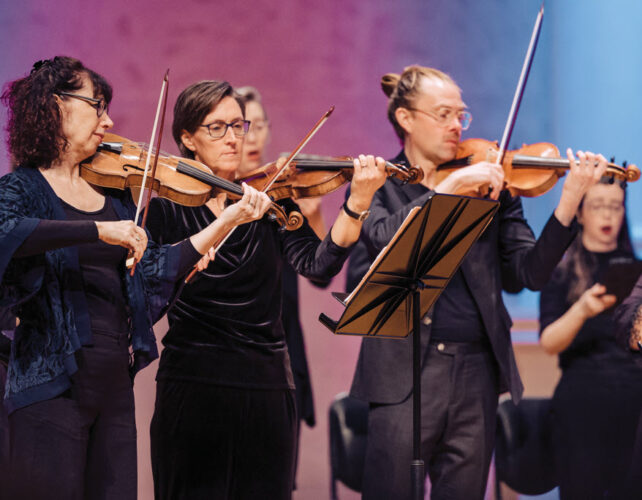
Indeed, the spring half of the ABO’s 25th season includes a partnership with a local modern dance company and a university choir for Purcell’s Dido and Aeneas. With performances at Emory University and at Spivey Hall, the show brings the ensemble full circle, back to the starting locations for early music in the city.
Despite the ATL’s booming population and wealth, Andrijeski says future ABO seasons will extend the orchestra’s reach, with concerts (and new revenue streams) in smaller but artsy regional towns such as Savannah, Chattanooga, Huntsville, and Birmingham.
“We’ve been working on our mission statement recently,” the group’s music director says, “trying to define ourselves — not thinking of how to pull people in and convince them that it’s good, but just to let them know what we do and our mission as an orchestra.”
She continues: “Even though we are all well educated in historical performance, that’s only a vehicle to reach the musicality and the excitement of the pieces we play. Audiences shouldn’t need to have any knowledge of historical performance to come to a concert and be moved. That shouldn’t be a prerequisite to enjoying it.”
CORRECTION: Due to an editorial error, an earlier version of this article in the printed EMAg (From Scratch, Jan. 2024) mistakenly quoted the ensemble’s artistic director, Julie Andrijeski, saying, “Atlanta is a great place to sell from but a difficult place to sell to.” Those were the author’s words and perspective, not Andrijeski’s.
Mark Gresham, an Atlanta native, is an award-winning composer, publisher of Lux Nova Press, and music journalist. He runs the classical and post-classical website earrelevant.net.

